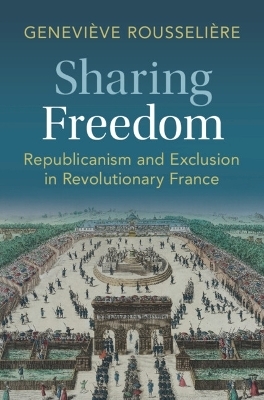
Sharing Freedom
Republicanism and Exclusion in Revolutionary France
Seiten
2024
Cambridge University Press (Verlag)
978-1-009-47731-4 (ISBN)
Cambridge University Press (Verlag)
978-1-009-47731-4 (ISBN)
Sharing Freedom presents the development of French republicanism from an older elitist theory of freedom into an inclusive theory of emancipation. Retracing the struggles of republicans during the French Revolution, it lays out the paradoxes that unwittingly led them to justify exclusions despite fervently embracing an expansion of freedom to all.
The French have long self-identified as champions of universal emancipation, yet the republicanism they adopted has often been faulted for being exclusionary – of women, foreigners, and religious and ethnic minorities. Can republicanism be an attractive alternative to liberalism, communism, and communitarianism, or is it fundamentally flawed? Sharing Freedom traces the development of republicanism from an older elitist theory of freedom into an inclusive theory of emancipation during the French Revolution. It uncovers the theoretical innovations of Rousseau and of revolutionaries such as Sieyès, Robespierre, Condorcet, and Grouchy. We learn how they struggled to adapt republicanism to the new circumstances of a large and diverse France, full of poor and dependent individuals with little education or experience of freedom. Analysing the argumentative logic that led republicans to justify the exclusion of many, this book renews the republican tradition and connects it with the enduring issues of colonialism, immigration, slavery, poverty and gender.
The French have long self-identified as champions of universal emancipation, yet the republicanism they adopted has often been faulted for being exclusionary – of women, foreigners, and religious and ethnic minorities. Can republicanism be an attractive alternative to liberalism, communism, and communitarianism, or is it fundamentally flawed? Sharing Freedom traces the development of republicanism from an older elitist theory of freedom into an inclusive theory of emancipation during the French Revolution. It uncovers the theoretical innovations of Rousseau and of revolutionaries such as Sieyès, Robespierre, Condorcet, and Grouchy. We learn how they struggled to adapt republicanism to the new circumstances of a large and diverse France, full of poor and dependent individuals with little education or experience of freedom. Analysing the argumentative logic that led republicans to justify the exclusion of many, this book renews the republican tradition and connects it with the enduring issues of colonialism, immigration, slavery, poverty and gender.
Geneviève Rousselière is a Franco-American political theorist. She is Assistant Professor of Political Science at Duke University. She is the co-editor of Republicanism and the Future of Democracy (Cambridge University Press, 2019).
Introduction: On the Universalization of Republican Freedom; 1. Plural Beginnings; 2. Rousseau's Proposal; 3. Revolutionary Republicanisms; 4. The Paradox of Republican Emancipation; 5. The Paradox of National Universalism; Conclusion: On French Republicanism.
| Erscheinungsdatum | 23.03.2024 |
|---|---|
| Zusatzinfo | Worked examples or Exercises |
| Verlagsort | Cambridge |
| Sprache | englisch |
| Maße | 159 x 235 mm |
| Gewicht | 540 g |
| Themenwelt | Geschichte ► Allgemeine Geschichte ► Neuzeit (bis 1918) |
| Geisteswissenschaften ► Geschichte ► Regional- / Ländergeschichte | |
| Geisteswissenschaften ► Philosophie | |
| Sozialwissenschaften ► Politik / Verwaltung ► Politische Theorie | |
| ISBN-10 | 1-009-47731-5 / 1009477315 |
| ISBN-13 | 978-1-009-47731-4 / 9781009477314 |
| Zustand | Neuware |
| Haben Sie eine Frage zum Produkt? |
Mehr entdecken
aus dem Bereich
aus dem Bereich
Europa 1848/49 und der Kampf für eine neue Welt
Buch | Hardcover (2023)
DVA (Verlag)
48,00 €
Giordano Bruno - ein ketzerisches Leben
Buch | Hardcover (2024)
C.H.Beck (Verlag)
29,90 €


